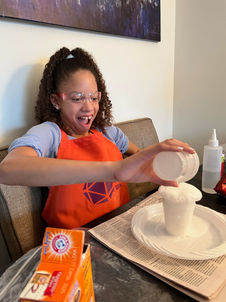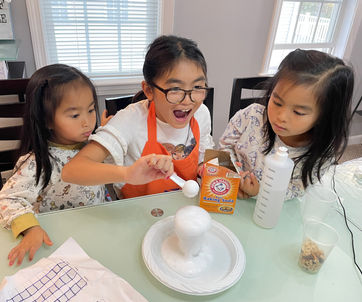Bringing the WOW of STEM to more young scientists!
This fall, we expanded programming—yet again!—by 40% to serve over 500 girls and gender-expansive youth in our FREE semester-long Science Clubs, held both virtually and in-person, exploring the wonders of chemistry! In a fun, supportive environment, they've fueled rockets with Alka-Seltzer, examined crystals and smashed open geodes, and shrieked with excitement at the overflowing chemical reaction of making fizzy slime.
As we look ahead to our 2023 "Dream Home" curriculum—all about architecture, engineering, and math—we need your help to ensure more girls from diverse backgrounds can experience the WOW of STEM!
The demand is huge—we need your help! You make these life-changing experiences possible. You can ensure more youth from underrepresented communities have access to high-quality STEM education and mentorship—to see themselves as future scientists and engineers—by making a donation today.
Help us raise $100,000 by December 31, so that the students who need it most can benefit from FREE programs at Science Club for Girls, in 2023 and beyond!

Science Club Fall 2022 by the numbers:
Over 500 girls in K-12
actively engaged in Science Clubs
+
700 materials kits delivered for
8 weeks of hands-on experiments
+
>80% of girls underrepresented in STEM
by race and economic factors
+
100+ volunteer STEM mentors
teaching weekly Science Clubs
+
More than 270,000 views of our Science TV Show SCFGLive! reaching an even wider audience
+
Over 28 years of engaging girls in STEM
through experiential education and mentorship
=
"Aha!" moments...more than we could count!

Empowering girls and gender-expansive youth to embrace STEM through meaningful mentorship and free, hands-on experiences

What We Know
-
An achievement gap exists between well-resourced and economically-stressed children from the moment they begin school.
-
Research on how children learn shows that learning that happens outside of the traditional classroom helps students see the relevance of academic subjects and leads to deeper interest, which in turn directly impacts achievement.
-
The achievement gap between Black and Hispanic students and their white and Asian peers was evident in the 2017 Next Generation math MCAS scores
-
The number of white students whose scores exceeded the standards was four times higher than Black or Hispanic students, and the number of Black and Hispanic students who did not meet the standard was almost three times as high as white students.
-
Research shows that girls begin to associate boys with science and math as early as grade two, and middle school is often when stereotypes and harmful associations cause many girls to avoid STEM subjects.
Economic Policy Institute 2015.
National Research Council 2009, 2011.
Department of Education 2017 profiles http://profiles.doe.mass.edu/statereport/nextgenmcas.aspx
Cvencek, D., Meltzoff, A.N., and Greenwald, A.G., Child Dev. 2011 May-Jun;82(3):766-79.














